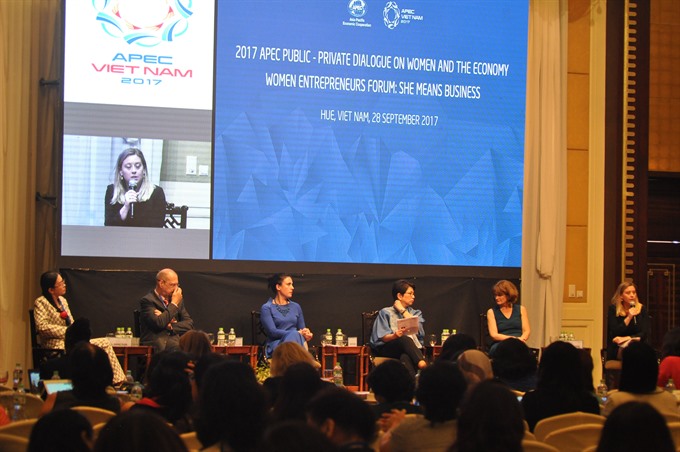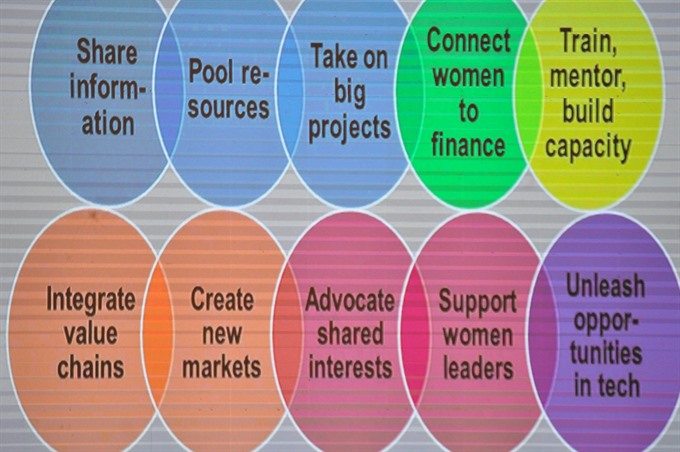 Society
Society

Asian-Pacific economies should do their best to dismantle barriers preventing women entrepreneurs from owning businesses so that by 2030 half the enterprises are owned by women, vice president Đặng Thị Ngọc Thịnh said on September 28.
 |
| Panelists at Huế APEC forum discuss the involvement of women in the digital world to develop their business. — VNS Photo Phước Bửu |
THỪA THIÊN-HUẾ — Asian-Pacific economies should do their best to dismantle barriers preventing women entrepreneurs from owning businesses so that by 2030 half of the enterprises are owned by women, vice president Đặng Thị Ngọc Thịnh said on September 28.
She spoke at the opening ceremony of a dialogue sponsored by the 21-member Asia-Pacific Economic Cooperation forum entitled “Public-Private Dialogue on Women and the Economy”.
“Both men and women working in public and private sectors should understand the capability and power of businesswomen, and do more to help them contribute to the national economy and society,” Thịnh said.
“Each economy should build up institutions and laws on gender equality to promote women’s empowerment. Enterprises should also map out strategy and policies on how to encourage the involvement of women in finance, economy and society,” she said.
One in four
Thịnh said although Vietnamese women account for 48 per cent of the workforce and 25 per cent of entrepreneur owners and managers, 1.2 million working-age women, constituting 2.3 per cent of the country’s labour force, were unemployed in 2016.
She expressed her hope that representatives at the event would propose optimal solutions on women’s empowerment among APEC member economies, and said the recommendations would be proposed at the APEC Summit in Đà Nẵng on November 6-11.
Speaking at the ceremony, UN Assistant Secretary-General Lakshmi Puri said: “This APEC Public-Private Dialogue provides us with an ideal platform to strategise on how to best contribute to unlocking women power in the world’s most dynamic and consolidated member economies that the APEC represents.”
Empowering women means enabling them to work equally in all the productive sectors - agriculture, manufacturing, services and technology sectors; in value and supply chains; in trade and investment networks; in finance - not only micro finance; and in entrepreneurship at the local, national, regional and global level, she said.
Chairman of the Việt Nam Chamber of Commerce and Industry (VCCI), Vũ Tiến Lộc, said one in four business people in Việt Nam are women, and predicted that businesswomen would be the saviours of the world economy in the future.
“Small and medium businesses owned by women operate throughout Việt Nam. Female managers of these enterprises had a great contribution to the growth in remote and poverty-stricken areas,” Lộc added.
 |
| Steps women are advised to follow to start a business. — VNS Photo Phước Bửu |
Facebook communities
Women are also encouraged to get more involved in cyber activities to develop their business and improve their economic situation, APEC representatives said at a panel discussion highlighting the role of women in a digital world.
The panelists said digital businesses are growing fast around the world. There are 65 million small- and medium-sized enterprises on Facebook, alone.
According to Dr Michael DiGregorio, Việt Nam Country Representative of The Asia Foundation, women have been hampered by housework from learning to use internet communications technology for their work.
“Vietnamese women customarily bear a dual burden of childcare and domestic work that limits their business opportunities,” he said, pointing out that Việt Nam has 31 per cent of registered businesses owned by women but a majority are small scale.
The panelists said other barriers preventing women from starting a business include lack of experience and financial insecurity. Some women lack confidence and do not feel quite ready to open their own business.
The panelists encouraged women to make use of support and advice from experienced entrepreneurs when they start a business.
Louise Williams from US-APEC Technical Assistance to Advance Regional Integration said women should rely on three types of resources: a business network, private sector initiatives and government services. Williams also suggested five priority areas on which women should focus: capital and assets, access to markets, capacity and skills, leadership and agency, innovation and technology.
The panelists also encouraged women to make use of free digital platforms, like Facebook, to create their own community where they can share experience and support each other. Those communities should be connected with others in different countries to help gain broader knowledge in each business sector. — VNS